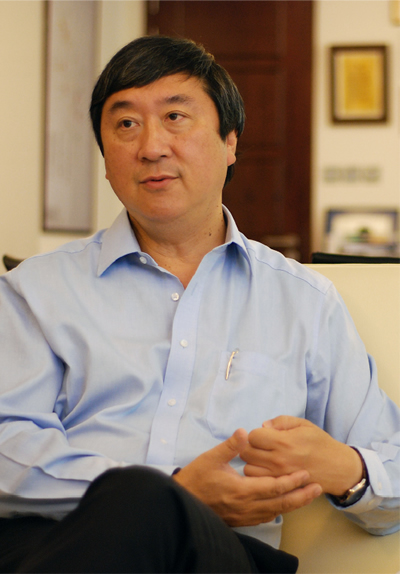
The Vice-Chancellor on Going Green
1. You are a member of the Council for Sustainable Development (SDC). How do you see your role in it?
The SDC is involved in advocacy and promotion. Its members who hail from different professional sectors, include two heads of academic institutions: one from a university—myself, and one from a secondary school. As an educator, my role is two-way: bringing environment-related knowledge to the council and to society, and through the council, familiarizing the University, its students and their parents with government policy.
2. You said in an interview that concern for the environment and promoting sustainable development is one of the University's three most important missions. What kind of role does a university like CUHK play in sustainable development in Hong Kong?
The University generates new knowledge for society through its many research projects related to sustainable development, such as those on reusable energy, on green building and on eco-friendly building structures. Knowledge transfer activities communicate such knowledge to the public, as do published papers and press releases.
We teach students about sustainable development, not only in environmental science subjects, but also General Education. In fact, all academic disciplines contribute to the topic by offering different perspectives—medicine, law, business, the arts and so on.
The campus is a good testing ground for new ideas and a students' practice room for new technologies and lifestyles. For instance, the rooftop of the School of Architecture building has a small organic farm and a workshop on sustainable farming. The social impact of such activities may not be much, but behavioural change begins with exposure and understanding.
3. Internally, what is the most urgent task in terms of carrying out sustainable development at CUHK? What are the challenges?
The most urgent problem is our ever increasing electricity consumption. Some lab equipment need to be running 24/7 in an air-conditioned environment; certain parts of the library are open around the clock; students sometimes engage in college activities till late into the night.
The challenge is striving to meet our carbon reduction target set out in the Campus Master Plan. The campus is now bigger in terms of both population and the number of buildings, due to the reversion to a four-year curriculum, especially with the double-cohort year in 2012-13.
It's crucial yet very difficult to change mindsets and behaviour. This can be done by educating CUHK members that a simple, low-carbon lifestyle can be fulfilling—going for vegetarian options regularly, walking or cycling rather than driving, recycling waste…. In other words, by showing them that less is more.
4. What new changes along the line of sustainable development, besides the recycling of kitchen waste, should we expect on campus?
Food waste reduction is very important. We need to reduce the source of waste and educate students against living an extravagant lifestyle. Besides that, the Bring Your Own Campaign advocates limiting the use of disposable items such as plastic water bottles and Styrofoam lunch boxes. I always bring my own eating utensils to the office. The Green Office Programme (GO!) calls for a paperless office and paper recycling.
5. You practise Green Monday, as we know. Could you tell us more about it?
I practise it for two reasons: to lose weight and to be green. Every Monday, I bring a lunch salad to work and try to eat a vegetarian dinner at home. On Mondays when there's a dinner appointment to make going meatless difficult, I compensate on another day. All in all, I make sure that I go meatless at least one day per week, and usually I end up with more than a day, as I always have salads whenever I lunch alone.
6. What other green practices do you or your family engage in?
We live at the very spacious Vice-Chancellor's Lodge which if you're using air-conditioners, requires a good many units to cool. But we just open the windows and use fans when we don't have visitors. Similarly, we turn off all the lights in the garden when we're alone.



